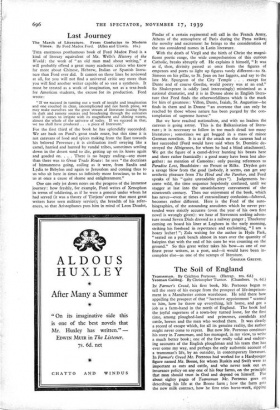Last Journey
The March of Literature. From Confucius to Modern Times. By Ford Madox Ford. (Allen and Unwin. r6s.)
THIS enormous posthumous book of Ford Madox Ford is a kind of literary equivalent of Mr. Wells's History of the
World: the work of " an old man mad about writing," it will probably offend a great many academic critics who know far more about Chinese, Hebrew, Italian or Spanish litera- ture than Ford ever did. It cannot on those lines be reviewed at all, for you will not find a universal critic any more than you will find another writer capable of so vast a synthesis. It must be treated as a work of imagination, not as a text-book for American students, the excuse for its production. Ford wrote :
" If we succeed in turning out a work of insight and imagination and one couched in clear, uncomplicated and not harsh prose, we may make ourselves see the great stream of literature issuing from its dark and remote sources and broadening through the centuries until it comes to irrigate with its magnificent and shining waters, almost the whole of the universe of today. If we succeed in that, we too shall have produced . . a piece of literature."
For the first third of the book he has splendidly succeeded. We are back on Ford's great trade route, but this time it is not caravans of food and spices making from the East towards his beloved Provence ; it is civilisation itself swaying like a
camel, harried and hunted by vandal tribes, sometimes settling down in the desert sand to die, getting up on its knees again and goaded on. . . . There is no happy ending—any more than there was to Great Trade Route: he sees " the doctrines of hilmaneness going, coiling as it were, from Sardis and Lydia to Babylon and again to Jerusalem and coming thus to us who sit here in times so infinitely more ferocious, to be to us at once a cause of shame and enlightenment."
One can only jot down notes on the progress of the immense journey: how freshly, for example, Ford writes of Xenophon in terms of soldiering, as if he were a general under whom he had served (it was a theory of Tietjens' creator that most great writers have seen military service); the breadth of his refer- ences, so that Aristophanes puts him in mind of Leon Daudet, Pindar of a certain regimental roll call in the French Army, Athens of the atmosphere of Paris during the Press strikes; the novelty and excitement he brings to the consideration of the too considered names in Latin literature.
With the death of Virgil and the birth of Christ the magni- ficent poetic range, the wide comprehension of this curious Catholic, breaks abruptly off. He explains it himself, " It was as if, then, divinity passed at once from the figures of emperors and poets to light up figures vastly different—to St.
Simeon on his pillar, to St. Joan on her faggots, and say to the late Mr. Spurgeon of the City Temple . . . except for Dante and of course Goethe, world poetry was at an end." So Shakespeare is oddly (and interestingly) minimised as a national dramatist, and it is in Donne alone in English litera- ture that Ford finds the otherworldliness which is the mark for him of greatness : Villon, Dante, Isaiah, St. Augustine—he finds in them and in Donne " an overtone that can only be reached by those whose nature has been purged by the con- templation of supreme horror."
But we have reached nationalism, and with no leaders the caravan is going astray. This is the Balkanisation of litera- ture ; it is necessary to follow in too much detail too many literatures ; sometimes we get bogged in a mass of minor German novelists. It is as if the attack on the caravan had at last succeeded (Ford would have said when St. Dominic de- stroyed the Albigenses, for whom he had a blind attachment). We get the figure of a camel-driver hunting his beasts here and there rather frantically : a good many have been lost alto- gether : no mention of Camoens: only passing references to Paradise Lost, Baudelaire : no Proust or Rilke. Dryden gets a savage blow from the goad (nobody, it seems, can get any aesthetic pleasure from The Hind and the Panther, and Ford speaks of his " quite unreadable plays "). Judgements be- come wild, the time sequence hopelessly confused, until we stagger at last into the unsatisfactory caravanserai of the nineteenth century. Then our enjoyment of the book, which has never—even at times of extraordinary confusion—faltered, becomes rather different. Here is the Ford of the auto- biographies, of the astounding anecdotes which he never pre- tended were strictly accurate (even the year of his own first novel is wrongly given): we hear of Stevenson seeking adven- ture round Seven Dials dressed as a railway ganger ; Thackeray coming on board his liner at Leghorn in the early morning, striking his forehead in repentance and exclaiming, " I am a hoary lecher! "; Zola waiting for the author in Hyde Park, " seated on a park bench almost in tears over the quantity of hairpins that with the end of his cane he was counting on the ground." So this great writer takes his bow—as one of our finest prose writers, as a poet, and—it would have been in- complete else—as one of the scamps of literature.
GRAHAM GREENE.




































































 Previous page
Previous page